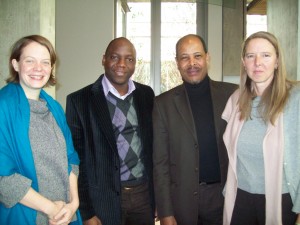Best Practices in Teaching Slavery: a Growing Network of Educators
Posted November 10th, 2010 by Katrina BrowneCategory: News and Announcements Tags: Katrina Browne, legacy of slavery, UNESCO, United Nations
 I had the amazing opportunity to be part of a working group conference, Defining New Approaches for Teaching the Transatlantic Slave Trade and Slavery: Teaching African History and African Diaspora History Workshop. The workshop was hosted by the Harriet Tubman Institute at York University in Toronto and sponsored by the U.N.’s UNESCO Slave Route Project. It was attended by educators, psychologists and historians from Latin America, Central America, the Caribbean, the U.S., Canada, Africa and Europe. We were applying ourselves to the question: what are the psychological consequences of slavery for descendants of enslaved Africans and descendants of the “white” populations that benefited from slavery? And in the face of those multi-generational consequences, what are the implications for how we teach about slavery and African civilization in schools.
I had the amazing opportunity to be part of a working group conference, Defining New Approaches for Teaching the Transatlantic Slave Trade and Slavery: Teaching African History and African Diaspora History Workshop. The workshop was hosted by the Harriet Tubman Institute at York University in Toronto and sponsored by the U.N.’s UNESCO Slave Route Project. It was attended by educators, psychologists and historians from Latin America, Central America, the Caribbean, the U.S., Canada, Africa and Europe. We were applying ourselves to the question: what are the psychological consequences of slavery for descendants of enslaved Africans and descendants of the “white” populations that benefited from slavery? And in the face of those multi-generational consequences, what are the implications for how we teach about slavery and African civilization in schools.
At the Tracing Center, we have heard again and again from African-American adults about intensely negative, even traumatic, experiences of being taught about slavery in middle school and high school. The common refrain is teachers who did not have the sensitivity and knowledge to teach this loaded history in a way that was empowering and provided dignity. We know too that European-American students and students of many other backgrounds get the wrong message when slavery isn’t taught well. This is a key moment when students will either be set up for rifts and divisions based on heritage, or it can be a golden opportunity to set them up for incredible grace and understanding and sense of common cause in the work of building a society that works for everyone. Our teacher workshops this fall in Rhode Island and for Christian educators via Calvin College in Michigan, were a chance to refine and share our pedagogical models for creating positive results.
The workshop in Toronto, with reports of how text books in Central America portray slavery, to how the Taubira law in France is impacting the teaching of slavery, to how U.S., British, and French psychologists are working with clients in black communities to frame their challenges in the context of post-traumatic slavery disorder or syndrome, to how these concepts are faring in the academic field of psychology, etc., etc. – the workshop raised up how daunting the challenges are, but how hopeful it is that kindred colleagues are working in similar veins and are now in a better position to collaborate on moving the work forward in all our countries.



